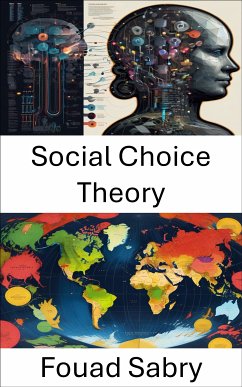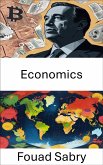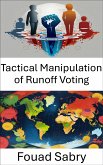Explore the complexities of decision-making with "Social Choice Theory," a key volume in the "Political Science" series. This book delves into how societies make collective choices and the underlying mathematical and philosophical foundations. Essential for those interested in governance, policy, and democratic processes, it provides a thorough examination of key concepts and theories in social choice.
Each chapter builds on the last, covering topics such as:
1. Social Choice Theory: Core concepts and significance in collective decision-making.
2. Condorcet Paradox: The issue of intransitive collective preferences.
3. Pareto Efficiency: Evaluating outcomes where no one can be better off without harming others.
4. Kenneth Arrow: Contributions to social choice theory.
5. Arrow's Impossibility Theorem: Challenges in creating a fair voting system.
6. Social Welfare Function: Aggregating individual preferences into collective decisions.
7. Independence of Irrelevant Alternatives: Ensuring choices are unaffected by irrelevant alternatives.
8. Gibbard-Satterthwaite Theorem: Limitations of strategic voting.
9. Welfare Economics: Improving social welfare through resource allocation.
10. Expected Utility Hypothesis: Decision-making to maximize expected utility.
11. Liberal Paradox: Tension between individual rights and collective decision-making.
12. Lexicographic Preferences: Ranking and decision-making processes.
13. Social Choice and Individual Values: Aligning personal preferences with collective decisions.
14. Quasitransitive Relation: Implications for preference aggregation.
15. Extended Sympathy: Understanding preferences and social choice.
16. Economic Justice: Relevance to equitable decision-making.
17. Preference (Economics): Modeling preferences and their impact.
18. Kevin W. S. Roberts: Contributions to social choice theory.
19. Prasanta Pattanaik: Influence on the field.
20. Jury Theorem: Conditions for accurate collective decisions.
21. Fractional Social Choice: Incorporating partial preferences into decision-making.
An invaluable resource for professionals, students, and enthusiasts, this book offers deep insights into social choice theory and its applications, making it a must-have for any political science library.
Each chapter builds on the last, covering topics such as:
1. Social Choice Theory: Core concepts and significance in collective decision-making.
2. Condorcet Paradox: The issue of intransitive collective preferences.
3. Pareto Efficiency: Evaluating outcomes where no one can be better off without harming others.
4. Kenneth Arrow: Contributions to social choice theory.
5. Arrow's Impossibility Theorem: Challenges in creating a fair voting system.
6. Social Welfare Function: Aggregating individual preferences into collective decisions.
7. Independence of Irrelevant Alternatives: Ensuring choices are unaffected by irrelevant alternatives.
8. Gibbard-Satterthwaite Theorem: Limitations of strategic voting.
9. Welfare Economics: Improving social welfare through resource allocation.
10. Expected Utility Hypothesis: Decision-making to maximize expected utility.
11. Liberal Paradox: Tension between individual rights and collective decision-making.
12. Lexicographic Preferences: Ranking and decision-making processes.
13. Social Choice and Individual Values: Aligning personal preferences with collective decisions.
14. Quasitransitive Relation: Implications for preference aggregation.
15. Extended Sympathy: Understanding preferences and social choice.
16. Economic Justice: Relevance to equitable decision-making.
17. Preference (Economics): Modeling preferences and their impact.
18. Kevin W. S. Roberts: Contributions to social choice theory.
19. Prasanta Pattanaik: Influence on the field.
20. Jury Theorem: Conditions for accurate collective decisions.
21. Fractional Social Choice: Incorporating partial preferences into decision-making.
An invaluable resource for professionals, students, and enthusiasts, this book offers deep insights into social choice theory and its applications, making it a must-have for any political science library.
Dieser Download kann aus rechtlichen Gründen nur mit Rechnungsadresse in A, B, BG, CY, CZ, D, DK, EW, E, FIN, F, GR, H, IRL, I, LT, L, LR, M, NL, PL, P, R, S, SLO, SK ausgeliefert werden.









